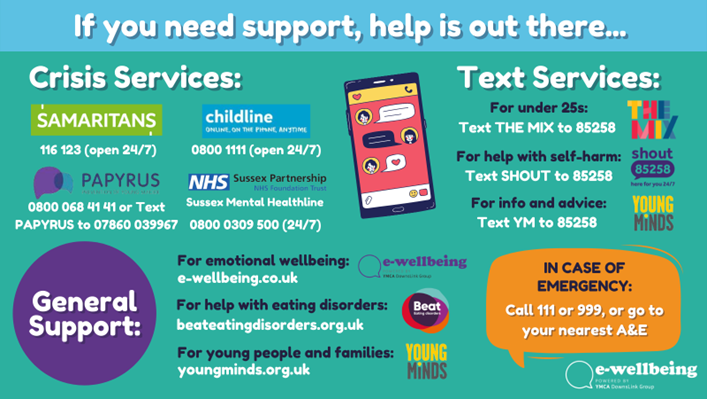Wellbeing at Hazelwick
As a school, we recognise the importance of physical and mental wellbeing in our community to enable everyone to thrive in school and achieve their potential. The aim of this page is to provide information, advice and support to anyone in our community, as well as signposting towards external agencies that might also be able to help.
Support at Hazelwick
At Hazelwick, student wellbeing and mental health is a key consideration. Staff receive training at multiple times throughout the year in relation to Mental Health and this informs teaching practice across the school. We also recognise that we are unable to remove all worries and concerns for students, and to do so would be to leave students ill-equipped to lead a productive and positive life in society. We therefore develop resilience amongst our students by celebrating their successes, identifying challenges that they have overcome in the past and supporting them with challenges they face in the present. We have an open culture where students are encouraged to speak out if they are concerned about themselves or a friend, as they will be listened to.
As well as all adults being trained in supporting students in safeguarding and wellbeing, there is an excellent pastoral team lead by the Heads of Year. Students see their form teachers every morning and build strong relationships with them. The Heads of Year lead their year group in all aspects and are a valuable source of support, guidance and advice for all students. We also have two school counsellors that offer 1-to-1 sessions with students via a referral process from Heads of Year, and an Inclusion Welfare Officer that supports targeted students.
Visual reminders of support and advice can be found across the school site, including posters from the Mental Health Foundation, Childline and the NSPCC. These provide advice, tips and contact details for support outside of school.
Strategies to support you
There are some simple strategies that can help you to regulate your feelings and worries:
5, 4, 3, 2, 1
Sit up in a chair with your feet pushing gently into the ground. Be aware of what is around you and list: 5 things you can see, 4 things you can hear, 3 things you can feel, 2 things you can smell, 1 thing you can taste. This will help you focus on what is around you and not other concerns in your head.
Box breathing
Sit up straight and picture a box in your mind. Focus on your breathing and visualise the 4 sides of the box (you can also draw the box with your finger on your leg). Breathe in for a count of 4, hold it for a count of 4, breathe out for a count of 4 and then hold for a count of 4. Repeat this for 4 minutes and it will regulate your breathing and help to manage anxiety and worry.
SEE through the worry
How much Sleep you get, paying attention to what you Eat and taking Exercise are three of the best ways to improve and support mental health. A healthy and balanced diet ensures the body gets what it needs to function effectively, managing hormone levels, energy levels and physical health. It is recommended that teenagers get 8-10 hours sleep every night. This enables you to reset, recharge and face the new day with the strength and resilience needed to overcome challenges. The endorphins released by exercise give the body and mind a natural boost, whilst also helping to support physical health.
The three areas (Sleep, Eating, Exercise) are proven to have a significant impact on our mental health and are an achievable goal to help you feel better.
Talk to someone
Whilst it can feel like there are worries mounting up sometimes, the easiest and quickest way to put them into context and plot a path through and over them is to tell someone. This could be a friend, a family member or a member of staff at school. Alternatively, you can text SHOUT to 85258 and get confidential support via text message.
Recognise the positives
It is very easy to dwell on the worries and negatives, and overlook the positives. Put aside time regularly to identify the things that have gone well, no matter how small. Celebrate those things, take pride in them and use them to bolster your confidence for future challenges.

Starter tick-list for Families
These are simple strategies that families can try to promote, support and develop strong mental health:
![]() Exercise and move to stimulate the brain and keep it healthy
Exercise and move to stimulate the brain and keep it healthy
![]() Maintain healthy eating habits and stay hydrated
Maintain healthy eating habits and stay hydrated
![]() Develop good sleep routines for increased resilience and better mental and physical health
Develop good sleep routines for increased resilience and better mental and physical health
![]() Have a digital detox to help improve sleep and reconnect with yourself
Have a digital detox to help improve sleep and reconnect with yourself
Useful Resources
- E Wellbeing - Home e-wellbeing
A website with a range of resources to support young people to understand their mental health, as well as providing strategies to help.
- Young Minds - Mental Health Support For Young People | YoungMinds
A website specialising in supporting young people with mental health and wellbeing that also provides coping strategies.
- Childline - Childline | Childline
A free, private and confidential service where a young person can talk about anything they want.
An online directory of information and advice, including specific sections on self-care, crisis management, social media, LGBTQ+ mental health support, and dealing with loss.








